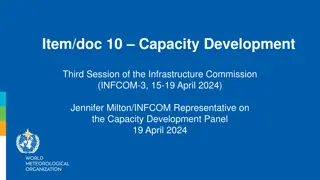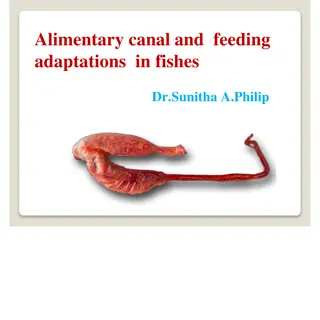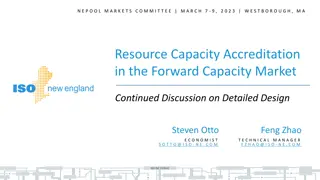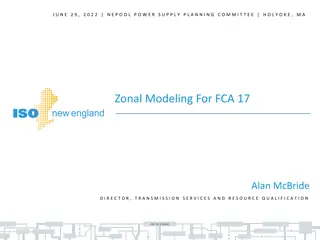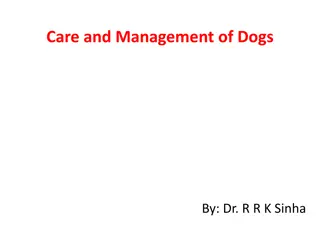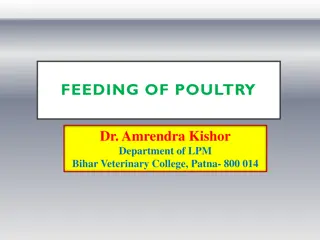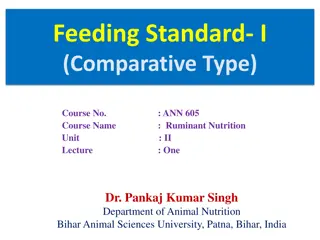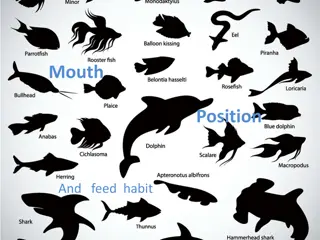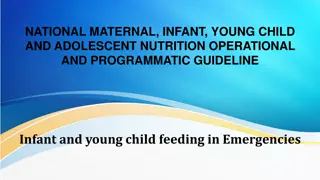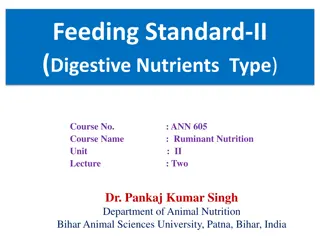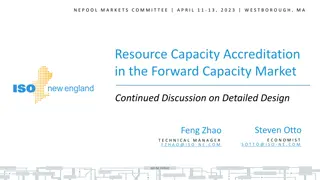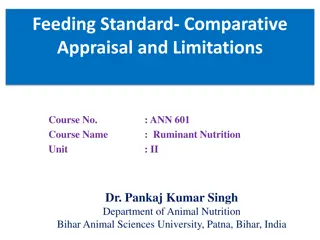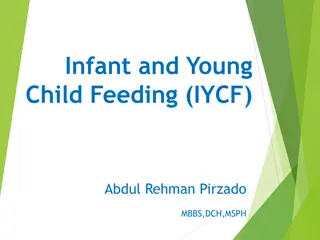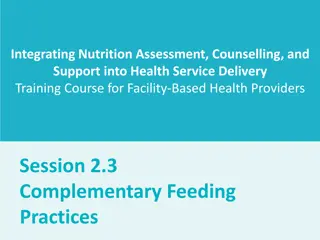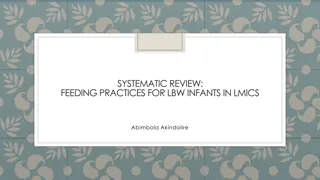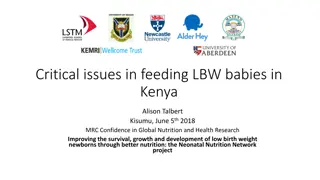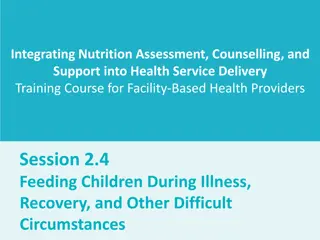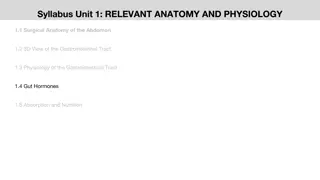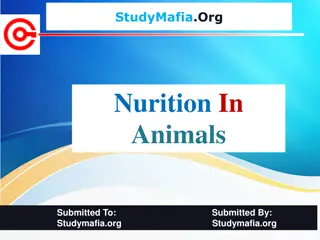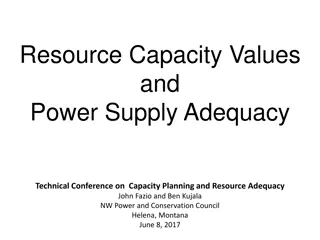INFCOM Capacity Development Initiatives Overview
INFCOM's capacity development initiatives focus on enhancing Earth system observations, closing capacity gaps on weather services, and supporting new opportunities in competencies and capabilities. Collaboration and coordination mechanisms have been established to facilitate sharing of information a
0 views • 11 slides
Alimentary Canal and Feeding Adaptations in Fishes by Dr. Sunitha A. Philip
The presentation discusses the alimentary canal and feeding adaptations in fishes, covering topics like the different regions of the gut, mouth types in fish, adaptation of teeth for specific diets, and the roles of the buccal cavity, pharynx, and gill rakers. It further explores how gill rakers var
0 views • 24 slides
Resource Capacity Accreditation in Forward Capacity Market Overview
Resource Capacity Accreditation project aims to enhance ISO-NE's accreditation processes in the Forward Capacity Market, supporting a reliable, clean-energy transition. Key concepts covered in this educational presentation include accreditation space, methods, benefits, challenges, and improvement o
1 views • 53 slides
Resource Capacity Accreditation in the Forward Capacity Market Discussion
The presentation discusses improvements in the Resource Capacity Accreditation project of ISO-NE's Forward Capacity Market to support a reliable, clean-energy transition. It includes details on seasonal components, reconfiguration auctions, trading obligations, and stakeholder schedules. Examples pr
3 views • 71 slides
Capacity Zone Modeling for Forward Capacity Auction 17 Results
This presentation unveils the Capacity Zone modeling calculations for Forward Capacity Auction 17 associated with the 2026-2027 Capacity Commitment Period by ISO-NE PUBLIC. It delves into boundary definitions, import-constrained zone modeling, and market rules guiding the assessments and modeling pr
0 views • 16 slides
Comprehensive Guide on Dog Care and Management
Learn about housing, feeding, and dimensions of kennels for dogs, along with tips on appropriate feeding that plays a crucial role in keeping dogs healthy and fit. Dr. R.R. K. Sinha provides valuable insights on the care and management of dogs, emphasizing the importance of suitable housing, feeding
0 views • 42 slides
Essential Guidelines for Feeding Poultry for Optimal Production
Feeding poultry is a crucial aspect of poultry production, accounting for a significant portion of total expenses. Quality feed and proper feeding methods are key to maximizing efficiency. Understanding the nutritional needs of poultry, including water, carbohydrates, proteins, fats, vitamins, and m
1 views • 18 slides
Understanding Feeding Standards and Their Objectives in Livestock Nutrition
Feeding standards provide tables indicating nutrient quantities necessary for livestock based on various physiological functions like growth, maintenance, lactation, and more. Objectives include guiding farmers in selecting balanced rations and classifying functions for individual animal needs. Glos
0 views • 13 slides
Proposal for Resource Capacity Accreditation in Forward Capacity Market
The ISO-NE has proposed improvements to the accreditation processes in the Forward Capacity Market (FCM) through the Resource Capacity Accreditation (RCA) project. The aim is to enhance the accreditation of resource contributions to ensure reliability during the transition to a cleaner energy mix. T
0 views • 59 slides
Understanding Fish Mouth Positions and Feeding Habits
The position of a fish's mouth reveals valuable information about its feeding habits, behavior, and lifestyle. Fish mouths can be categorized as superior (upward-facing), terminal (forward-facing), or inferior (downward-facing), each adapted for specific feeding strategies. Superior mouths are ideal
5 views • 10 slides
Infant and Young Child Feeding in Emergencies: Operational Guidelines
Infant and Young Child Feeding in Emergencies (IYCF-E) focuses on protecting and supporting safe feeding practices for infants and young children during all types of emergencies to reduce mortality and morbidity risks. Key actions include developing policies, training staff, coordinating operations,
4 views • 10 slides
Evolution of Feeding Standards for Ruminants: A Historical Perspective
The evolution of feeding standards for ruminants dates back to the 19th century, with pioneers like Grouven and Wolff introducing various criteria based on nutrient types and digestibility. Despite initial shortcomings, subsequent refinements by researchers like Professor Kuhn and Atwater have shape
0 views • 18 slides
Resource Capacity Accreditation in the Forward Capacity Market: Continued Discussion and Detailed Design
The Resource Capacity Accreditation (RCA) project by ISO-NE aims to enhance accreditation processes in the Forward Capacity Market (FCM) to support a reliable, clean-energy transition. This presentation focuses on seasonal components of Capacity Supply Obligations (CSO), Pay-for-Performance (PFP) ob
0 views • 58 slides
Understanding Feeding Standards in Ruminant Nutrition
Feeding standards play a crucial role in determining the nutritional needs of animals for optimal health and productivity. They consider factors like productivity, product composition, and physiological conditions, guiding effective nutritional management. Despite their usefulness, feeding standards
0 views • 8 slides
Understanding Self-Neglect, Hoarding, and the Mental Capacity Act (2005)
Self-neglect and hoarding are complex issues often intertwined with mental capacity challenges. The Mental Capacity Act (2005) outlines capacity assessments, decision-making criteria, and challenges faced by professionals in safeguarding individuals. Recognizing the need for trauma-informed care in
1 views • 16 slides
Understanding Legal and Mental Capacity in Healthcare Decisions
Clinical specialist occupational therapist, Louise Lawlor, advocates for patients' rights and decision-making capacity in healthcare settings. She emphasizes the importance of legal and mental capacity in making informed decisions, highlighting relevant legislation, guidance documents, and a functio
0 views • 24 slides
Sheep and Goat Clinic: Feeding, Exercising, and Show Preparation Tips
Topics covered in the Sheep and Goat Clinic include feeding strategies (last 90 days), the importance of balancing fat levels, exercising routines leading up to show day, and final points on feeding and fat management. The images provide valuable insights on feeding athletes, understanding fat level
0 views • 20 slides
Global Impact of Infant and Young Child Feeding (IYCF) Strategies
Global strategies like Infant and Young Child Feeding (IYCF) developed by WHO and UNICEF aim to address the high mortality rates among children under 5 due to malnutrition. The strategies emphasize the importance of appropriate feeding practices during pregnancy, lactation, and early childhood to co
0 views • 14 slides
Integrating Nutrition Assessment and Counselling: Complementary Feeding Practices
This training course focuses on educating facility-based health providers on complementary feeding practices, emphasizing the importance of introducing solid foods along with breastfeeding at 6 months. The session covers topics like nutrition gaps in breast milk, optimal feeding principles, and util
0 views • 48 slides
Feeding Practices for LBW Infants in LMICs
Improved survival rates of small babies highlight the importance of nutrition for LBW infants. Research into feeding practices in LMICs is crucial for promoting growth and development. Studies compare formula milk to human milk, exploring effects on growth, development, morbidity, and mortality. Evi
0 views • 21 slides
Importance of Feeding Infants with Breast Milk and Iron-Fortified Formula
Breast milk and iron-fortified infant formula are recommended for infants to meet their nutritional needs and support optimal development. Breast milk offers numerous health benefits, protecting infants from illnesses and reducing the risk of obesity. Iron-fortified formula is a suitable alternative
0 views • 23 slides
Challenges in Feeding Low Birth Weight Babies in Kenya
Addressing critical issues in feeding low birth weight babies in Kenya, including the lack of accurate birth weight measurements, preterm birth rates, and the risks associated with formula milk feeding. Strategies such as promoting expressed breastmilk and supporting mothers in neonatal units are di
2 views • 15 slides
Guidance for Complementary Feeding in Infants
After 6 months of age, breastfed infants may struggle to meet their nutrient needs from milk alone, necessitating the introduction of complementary foods. Implementing guiding principles can help ensure optimal nutrition and growth, including exclusive breastfeeding for the first 6 months, practicin
0 views • 18 slides
Exploring Capacity and Volume in Practical Settings
Explore the concepts of volume and capacity through engaging activities involving measuring liquid in containers, understanding units like milliliters and liters, and solving capacity-related questions. Discover how to work out different measurements and practice practical capacity in the kitchen wi
0 views • 7 slides
Understanding Enthalpy and Heat Capacity in Chemistry
Enthalpy is a measure of total energy in a system, represented as H = E + P.V. Heat at constant pressure relates to enthalpy changes. Calorimetry and heat capacity help measure and understand heat in chemical reactions. Specific heat capacity and molar heat capacity play key roles in determining ene
0 views • 16 slides
Assisting with Oral Feeding, Dysphagia Management, and Enteral Tube Feeding in Healthcare
This content covers essential aspects of assisting with oral feeding for individuals at risk for aspiration, managing dysphagia with specific recommendations and diet progression, and enteral tube feeding procedures and complications. It emphasizes safety, dignity, and independence in feeding practi
3 views • 12 slides
Assisting with Enteral Tube Feeding and Dysphagia Management
This content covers essential information on assisting with oral feeding for patients at risk of aspiration, managing dysphagia, diet progression, and enteral tube feeding procedures. It emphasizes safety, independence, and dignity in feeding practices. The content includes tips for preventing aspir
0 views • 12 slides
Integrating Nutrition Assessment and Counseling for Child Feeding During Illness
This training session focuses on the importance of feeding children during illness and recovery, discussing feeding practices and options in difficult circumstances. Participants will learn strategies to encourage children to eat during challenging times, emphasizing the goal of continuing feeding r
0 views • 32 slides
Workshop on New Approaches to Statistical Capacity Development in Lao PDR
This workshop, hosted by PARIS21 and UNDP, focuses on enhancing statistical capacity development in Lao PDR. It covers topics like successful capacity development programs, partnerships for national statistics development, and prioritizing needs versus international requirements. The Lao Statistics
0 views • 15 slides
Changes in Capacity Allocation Regulations for Gas Infrastructures in Portugal
The new regulation in Portugal brings significant changes in capacity booking and trading to promote convergence with CAM NC and enable a secondary market. Major changes include ex-ante payment of capacity rights, capacity allocation via a booking platform, and enhancement of liquidity in the second
0 views • 13 slides
Ration Formulation and Feeding Practices for Dairy Cattle and Buffaloes
This informative article discusses the importance of colostrum feeding, milk feeding to calves, and milk feeding schedules for dairy cattle and buffaloes during various phases. It emphasizes the significance of timely colostrum intake for immunity development and the proper feeding of whole milk or
0 views • 20 slides
The Assisted Decision-Making (Capacity) Act 2015 in the Criminal Justice Context
The Assisted Decision-Making (Capacity) Act 2015 introduces key reforms such as the abolition of wards of court system for adults, a statutory functional test of capacity, new guiding principles, a three-tier framework for support, and tools for advance planning. It emphasizes functional assessment
0 views • 17 slides
Understanding Capacity Challenges in Wills: Legal Insights
Testators must possess mental capacity when making a will, as established in legal cases like Banks v. Goodfellow. The common law test for testamentary capacity remains relevant despite the Mental Capacity Act 2005. The Banks v. Goodfellow test outlines the required mental power for making a valid w
0 views • 18 slides
Somerset Mental Capacity Training Session June 2023
This information outlines a mental capacity drop-in session for care providers in June 2023, hosted by Chris Hamilton from Somerset Council. It covers topics like the aim of the Mental Capacity Act, the Somerset mental capacity competency framework, and the importance of staff training. It emphasize
0 views • 21 slides
Understanding Re-feeding Syndrome: Metabolic Alterations and Pathophysiology
Re-feeding Syndrome (RS) is a critical condition characterized by severe metabolic changes during the repletion of underweight or malnourished individuals. The syndrome's hallmark is severe hypophosphatemia, leading to multisystem complications. This summary delves into the biochemical basis of RS,
0 views • 25 slides
Understanding the Role of Gut Hormones in Regulating Feeding Behavior
The syllabus covers relevant anatomy and physiology related to the gastrointestinal tract, emphasizing the regulation of feeding processes. It discusses the role of gut hormones such as ghrelin, obestatin, cholecystokinin, pancreatic polypeptide (PP), and peptide YY (PYY) in controlling appetite, en
0 views • 7 slides
Capacity Allocation Mechanisms (CAM) Business Rules Workshop Summary
This summary provides insights into the Capacity Allocation Mechanisms (CAM) Business Rules Workshop held at Ashling Hotel, Dublin on July 2, 2014. The workshop covered topics such as CAM business rules scope, key features, auction processes, code modifications, implementation timelines, and consult
0 views • 32 slides
Understanding Capacity Development in Water Systems
Capacity development is crucial for water systems to acquire and maintain technical, managerial, and financial capabilities in order to consistently provide safe drinking water. Federal requirements mandate new public water systems to demonstrate capacity, with states required to have strategies to
0 views • 8 slides
Understanding Nutrition in Animals: Types and Process
Nutrition in animals is vital for their survival, with various categories like herbivores, carnivores, and omnivores. Different modes of nutrition include filter feeding, deposit feeding, bulk feeding, fluid feeding, and suction feeding. The process of nutrition involves ingestion, digestion, absorp
0 views • 14 slides
Resource Capacity Values and Power Supply Adequacy Conference Highlights
Explore insights from the Resource Capacity Values and Power Supply Adequacy Technical Conference, covering topics like integrated vs. standalone capacity values, utilizing hydro storage to increase capacity, and the 2021-22 Adequacy Summary. Learn about the importance of integrated capacity values
0 views • 9 slides
